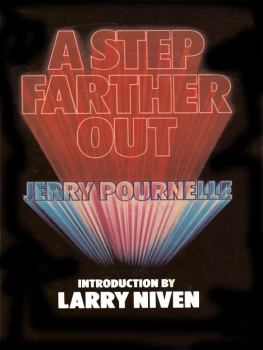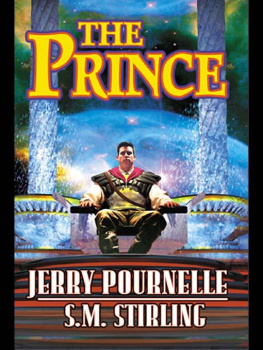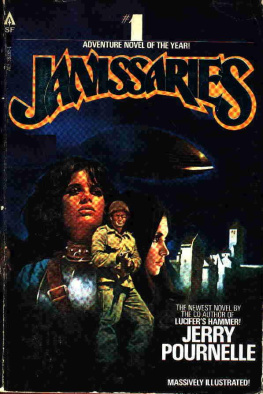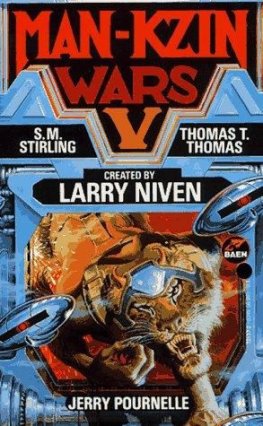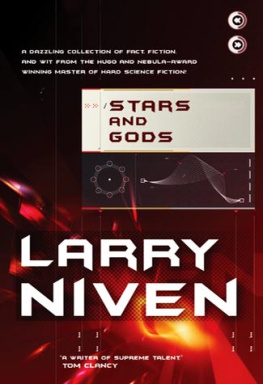Jerry Pournelle - A Step Farther Out
Here you can read online Jerry Pournelle - A Step Farther Out full text of the book (entire story) in english for free. Download pdf and epub, get meaning, cover and reviews about this ebook. year: 1980, publisher: W. H. Allen, genre: Children. Description of the work, (preface) as well as reviews are available. Best literature library LitArk.com created for fans of good reading and offers a wide selection of genres:
Romance novel
Science fiction
Adventure
Detective
Science
History
Home and family
Prose
Art
Politics
Computer
Non-fiction
Religion
Business
Children
Humor
Choose a favorite category and find really read worthwhile books. Enjoy immersion in the world of imagination, feel the emotions of the characters or learn something new for yourself, make an fascinating discovery.
- Book:A Step Farther Out
- Author:
- Publisher:W. H. Allen
- Genre:
- Year:1980
- Rating:5 / 5
- Favourites:Add to favourites
- Your mark:
- 100
- 1
- 2
- 3
- 4
- 5
A Step Farther Out: summary, description and annotation
We offer to read an annotation, description, summary or preface (depends on what the author of the book "A Step Farther Out" wrote himself). If you haven't found the necessary information about the book — write in the comments, we will try to find it.
A Step Farther Out — read online for free the complete book (whole text) full work
Below is the text of the book, divided by pages. System saving the place of the last page read, allows you to conveniently read the book "A Step Farther Out" online for free, without having to search again every time where you left off. Put a bookmark, and you can go to the page where you finished reading at any time.
Font size:
Interval:
Bookmark:
Jerry Pournelle
This is a work of fiction. All the characters and events portrayed in this book are fictional, and any resemblance to real people or incidents is purely coincidental.
Copyright 1979 by Jerry Pournelle
Baen Publishing Enterprises
P.O. Box 1403
Riverdale, NY 10471
www.baen.com
ISBN 10: 0-4910-2941-1
ISBN 13: 978-0-4910-2941-4
First Ebook printing, October 2008
Chapters of this book have been previously published (in substantially different form) in Galaxy magazine as follows:
"Survival with Style": March 1976, copyright 1976 by UPD Publishing Corporation, Inc.
"Blueprint for Survival": May 1976, copyright 1976 by UPD Publishing Corporation, Inc.
"How Long to Doomsday?": June 1974, copyright 1974 by UPD Publishing Corporation, Inc.
"That Buck Rogers Stuff": December 1976, copyright 1976 by UPD Publishing Corporation, Inc.
"Here Come the Brains": Published as "Here Come the Brains," November 1974, copyright 1974 by UPD Publishing Corporation, Inc., and as "Science and Man's Future," September 1976, copyright 1976 by UPD Publishing Corporation, Inc.
"The Big Rain": September 1975, copyright 1975 by UPD Publishing Corporation, Inc.
"Flying Saucers, " as "Guess What? Flying Saucer Research is Respectable": August 1975, copyright 1975 by UPD Publishing Corporation, Inc. "Building The Mote in Cod's Eye": January 1976, copyright 1976 by UPD Publishing Corporation, Inc.
"Gravity Waves, Black Holes, and Cosmic Censors," as "Intro: Cosmic Censors": December 1974, copyright 1974 by UPD Publishing Corporation, Inc. "Fuzzy Black Holes Have No Hair"; January 1975, copyright 1975 by UPD Publishing Corporation, Inc.
"Crashing Neutron Stars, Mini Black Holes, and Spacedrives": November 1976, copyright 1976 by UPD Publishing Corporation, Inc.
"In the Beginning...": October 1975, copyright 1975 by UPD Publishing Corporation, Inc.
"Halfway to Anywhere": April 1974, copyright 1974 by UPD Publishing Corporation, Inc.
"Ships for Manned Spaceflight": October 1974, copyright 1974 by UPD Publishing Corporation, Inc.
"Life Among the Asteroids": July 1975, copyright 1975 by UPD Publishing Corporation, Inc.
"What's It Like Out There?": May 1977, copyright 1977 by UPD Publishing Corporation, Inc.
"A Potpourri": June 1977, copyright 1977by UPD Publishing Corporation, Inc. "Highways to Space": September 1976, copyright 1976 by UPD Publishing Corporation, Inc.
"Come Fly With Me": May 1978, copyright 1978 by UPD Publishing Corporation, Inc.
"The Tools of the Trade": June 1978, copyright 1978 by UPD Publishing Corporation, Inc.
"Fusion without Ex-Lax": October 1976, copyright 1976 by UPD Publishing Corporation, Inc.
"Can Trash Save Us?": July 1977, copyright 1977 by UPD Publishing Corporation, Inc.
"The Moral Equivalent of War": March 1978, copyright 1978 by UPD Publishing Corporation, Inc.
For Jim Baen,
an extraordinarily good friend and editor.
Acknowledgments:
Research for this book was supported in part by grants from Pepperdine University and the Vaughn Foundation, to both of whom the author gives respectful thanks. Opinions in this work are the sole responsibility of the author.
It is obviously impossible to thank all those who have significantly contributed to a work this size. However, special thanks are due to Ejlar Jakobssen, who first encouraged me to do a regular science column; to Jim Baen, his successor as editor at Galaxy, who became invaluable for his topic suggestions and who unarguably improved the result; to Freeman Dyson, who generously granted ideas and interviews; to Dr. Gerald Yonas and Dr. John Penitz of Sandia Corporation; Dr. Petr Beckmann; Russell Seitz; A E. van Vbgt and Robert Bloch for their encouragement; Edmund Clay; and Larry Niven. Thanks are also due the members of the Los Angeles Science Fantasy Society, Inc., who were hardy enough to listen to my readings of these essays before they saw print.
It is also traditional for an author to thank his wife for putting up with him while he went through the emotional storms so often associated with writing. In my own case the thanks are for reasons considerably more valid than tradition.
JEP Hollywood, 1978
Jerry Pournelle is out to make the whole world rich.
He's been at this for some time. Like a good many of his colleagues, Jerry was sucked into the space sciences by science fiction. He was building rockets for the government back when they had to steal the parts from other projects, and get the work done by sneaking back into the plant after clocking out. He's been building the future since I was in grade school, and he's still at it.
Of course, he would prefer to build it his way. Jerry has less of the ability to "suffer fools gladly" than anyone I know. (I'm not too good at that myself.)
His ambitions are impressive. In this book you'll find laid out for you several routes to a future in which the entire world is as wealthy as the United States is today... and that is as wealthy as any nation has been in human history. He does not intend that we should confine ourselves to Only One Earth.
Well, you'll get to that. Let me deal with another question. Do we want the whole world rich?
I happen to think we do, but I've heard other opinions.
Do you feel that your soul and body will benefit if you eat nothing but organically grown fruits and vegetables? You may well be right; but there's a reason why those scrawny carrots are so expensive. Without fertilizers and bug sprays the tomatoes, etc., might not come out of the ground. (Ours didn't!) Wealth lets you pay someone else to grow it. If you go the whole route, forming a commune, living as your ancestors did, eating only food you grow yourself without technological help... then wealth lets you go on eating after the crop fails.
More generally, the right to live as if you were poor is inalienable. What you stand to lose is the right to live otherwise. Through your laziness or your inattention or through listening to the wrong saviors, you may condemn all future generations to involuntary poverty.
Nobody can be forced to spend wealth. That applies to you as thoroughly as it applies to the Indian rice farmer or Brahmin mendicant. Either can simply ignore the wealth that Dr. Pournelle proposes to drop on his head.
Granted that there are problems. A wealthy world would aggravate the servant problem no end.
Remember when people could sell themselves into slavery in order to eat? There was a ready market, because machines did not yet compete with muscle power. Those halcyon days are gone. With no good reason to fear for their jobs, servants have already become arrogant enough that most people would rather let a machine do it.
Well, why not? In the past few decades we've developed ultra-dependable ovens, vacuum cleaners, dishwashers, washer-dryers, soaps and detergents and other specialized chemicals for tasks each of which was once served by elbow grease (and somebody else's elbows, with any luck). The controls on my microwave oven have a better memory than my mother's cook, and my mother's cook quits more often.
In an age of inflation, the price of computer capability is going down. Ten years from now, your chauffeur may well be a computer; and why not? It would take up less room in the car and far less room in the house.
Consider backpacking. Over the decades, what was once a test of survival has become comfortable. Roads carry you into the wilderness. There you carry freeze-dried food and a lightweight mummy bag and air mattress on a contoured pack with a hip belt. Naturally the trails grow crowded. The population increases, the wilderness decreases. Already people propose to put glittering solar power collectors all over perfectly good deserts, instead of in orbit, as God intended.
Font size:
Interval:
Bookmark:
Similar books «A Step Farther Out»
Look at similar books to A Step Farther Out. We have selected literature similar in name and meaning in the hope of providing readers with more options to find new, interesting, not yet read works.
Discussion, reviews of the book A Step Farther Out and just readers' own opinions. Leave your comments, write what you think about the work, its meaning or the main characters. Specify what exactly you liked and what you didn't like, and why you think so.

